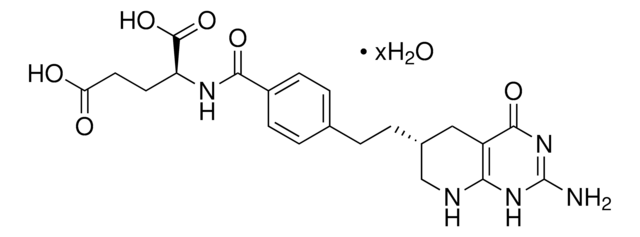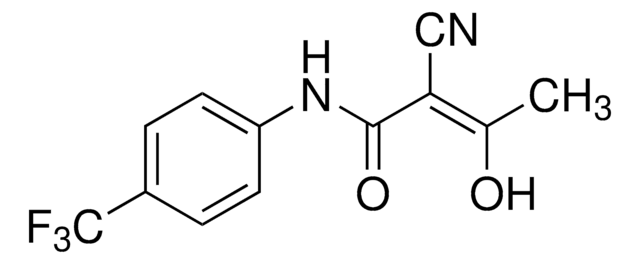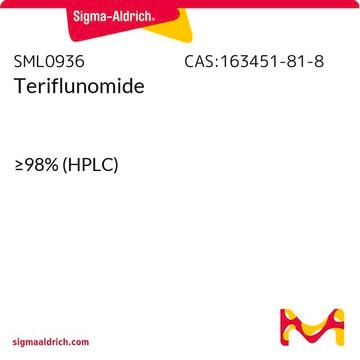L5025
Leflunomide
Immunosuppressant
Synonyme(s) :
5-Methylisoxazole-4-(4-trifluoromethyl)carboxanilide
About This Item
Produits recommandés
Niveau de qualité
Pureté
≥98% (TLC)
Forme
powder
Pf
166.5 °C
Solubilité
methanol: 19.60-20.40 mg/mL, clear, colorless to faintly yellow
Mode d’action
enzyme | inhibits
Température de stockage
2-8°C
Chaîne SMILES
Cc1oncc1C(=O)Nc2ccc(cc2)C(F)(F)F
InChI
1S/C12H9F3N2O2/c1-7-10(6-16-19-7)11(18)17-9-4-2-8(3-5-9)12(13,14)15/h2-6H,1H3,(H,17,18)
Clé InChI
VHOGYURTWQBHIL-UHFFFAOYSA-N
Informations sur le gène
human ... DHODH(1723)
Vous recherchez des produits similaires ? Visite Guide de comparaison des produits
Application
Actions biochimiques/physiologiques
Mention d'avertissement
Danger
Mentions de danger
Conseils de prudence
Classification des risques
Acute Tox. 3 Oral - Eye Irrit. 2 - Skin Irrit. 2 - STOT SE 3
Organes cibles
Respiratory system
Code de la classe de stockage
6.1C - Combustible acute toxic Cat.3 / toxic compounds or compounds which causing chronic effects
Classe de danger pour l'eau (WGK)
WGK 1
Point d'éclair (°F)
Not applicable
Point d'éclair (°C)
Not applicable
Équipement de protection individuelle
dust mask type N95 (US), Eyeshields, Faceshields, Gloves
Certificats d'analyse (COA)
Recherchez un Certificats d'analyse (COA) en saisissant le numéro de lot du produit. Les numéros de lot figurent sur l'étiquette du produit après les mots "Lot" ou "Batch".
Déjà en possession de ce produit ?
Retrouvez la documentation relative aux produits que vous avez récemment achetés dans la Bibliothèque de documents.
Les clients ont également consulté
Notre équipe de scientifiques dispose d'une expérience dans tous les secteurs de la recherche, notamment en sciences de la vie, science des matériaux, synthèse chimique, chromatographie, analyse et dans de nombreux autres domaines..
Contacter notre Service technique













